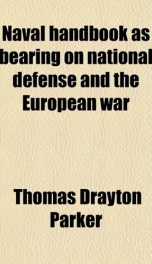naval handbook as bearing on national defense and the european war

Purchase of this book includes free trial access to www.million-books.com where you can read more than a million books for free. This is an OCR edition with typos. Excerpt from book: CHAPTER III THE CRUISER"THE EYES OF THE FLEET" THE fact that most of the sea fighting in the present war has been between cruisers has led some people to suppose that the cruiser has supplanted the battleship as a line-smashing battler. Far from it. The German victory off Coronel in the Pacific, the British victory off the Falkland Islands, and the North Sea battle in which the Bliicher sank, were cruiser fights; but merely because the dreadnoughts were playing their cat-and-mouse game elsewhere. These fights would rank with cavalry skirmishes ashore, and a pitched battle between the main forces is still of the future. Ships of any classeven submarines or airshipsmay fight if they meet; only recently the report was that an Austrian submarine had sunk an Italian of her kind. The fact, therefore, that cruisers have met and fought must not give us a wrong impression as to their functions. What is the function of the cruiser? The cruiser is the descendent of the old-time frigate, "the eyes of the fleet." In order to see without being caught, it must have one quality above all othersspeed. Having this quality, it is well fitted for certain other dutiesparticularly for running down the merchant ships of an enemy. In a thoroughly modern navy, "sight seeing" is left to a special class of cruisers (see below), and a large part of the cruiser force maybe engaged in commerce destroying or the convoying of friendly commerce. This quality of speed lends itself to other uses, so that we find cruisers amalgamated with other types, making raids on enemy coast, destroying enemy torpedo craft, and even taking a place in the first line of battle. We have already named the important types of the cruiser class"battle," "armored," and "protected" cruisers. Some discussion of these types ...
Users who have this book
Users who want this book
What readers are saying
What do you think? Write your own comment on this book!
write a commentif you like naval handbook as bearing on national defense and the european war try:
Other books by this author
Do you want to exchange books? It’s EASY!
Get registered and find other users who want to give their favourite books to good hands!

